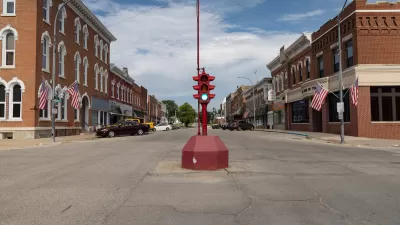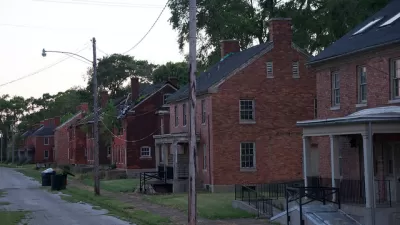As developers plan city-saving projects like a billion-dollar bridge to Canada, Detroit residents demand that tangible benefits go to their communities. City council may pass an ordinance to that effect.

Detroit has recently become the focus of a number of high-dollar redevelopment projects, and hype abounds about the city's open future. For residents still living in what remains of "old Detroit," these projects can be a mixed blessing. Alexis Stephens reports on the movement for community benefits agreements (CBAs). "For new projects with an investment of at least $15 million, expansions or renovations of at least $3 million, or projects seeking at least $300,000 in public tax subsidies, developers would have to create legally binding documents guaranteeing jobs or quality-of-life protections for the community [...]"
Stephens interviews Rashida Tlaib, a past Michigan State Representative and current community partnerships and development director for the Sugar Law Center for Economic and Social Justice. According to Tlaib, "Many of the community residents had recognized that saying no to the projects wasn't working anymore and trying to get a seat at the table would be a better option."
Tlaib argues that previous attempts to include community voices foundered as electoral sponsors rotated out of office. A mandatory CBA requirement might begin to address the problem. "We are embedding it into a Detroit ordinance, [because] I think it was just critical. I think Council President Jones hit it on the head when she said, 'Look, when I’m gone, I want something in place so we’re not always relying on trying to reeducate people that are coming into office.'"
FULL STORY: Detroit Is Taking the Lead in the Community Benefits Movement

Planetizen Federal Action Tracker
A weekly monitor of how Trump’s orders and actions are impacting planners and planning in America.

Map: Where Senate Republicans Want to Sell Your Public Lands
For public land advocates, the Senate Republicans’ proposal to sell millions of acres of public land in the West is “the biggest fight of their careers.”

Restaurant Patios Were a Pandemic Win — Why Were They so Hard to Keep?
Social distancing requirements and changes in travel patterns prompted cities to pilot new uses for street and sidewalk space. Then it got complicated.

Platform Pilsner: Vancouver Transit Agency Releases... a Beer?
TransLink will receive a portion of every sale of the four-pack.

Toronto Weighs Cheaper Transit, Parking Hikes for Major Events
Special event rates would take effect during large festivals, sports games and concerts to ‘discourage driving, manage congestion and free up space for transit.”

Berlin to Consider Car-Free Zone Larger Than Manhattan
The area bound by the 22-mile Ringbahn would still allow 12 uses of a private automobile per year per person, and several other exemptions.
Urban Design for Planners 1: Software Tools
This six-course series explores essential urban design concepts using open source software and equips planners with the tools they need to participate fully in the urban design process.
Planning for Universal Design
Learn the tools for implementing Universal Design in planning regulations.
Heyer Gruel & Associates PA
JM Goldson LLC
Custer County Colorado
City of Camden Redevelopment Agency
City of Astoria
Transportation Research & Education Center (TREC) at Portland State University
Camden Redevelopment Agency
City of Claremont
Municipality of Princeton (NJ)





























